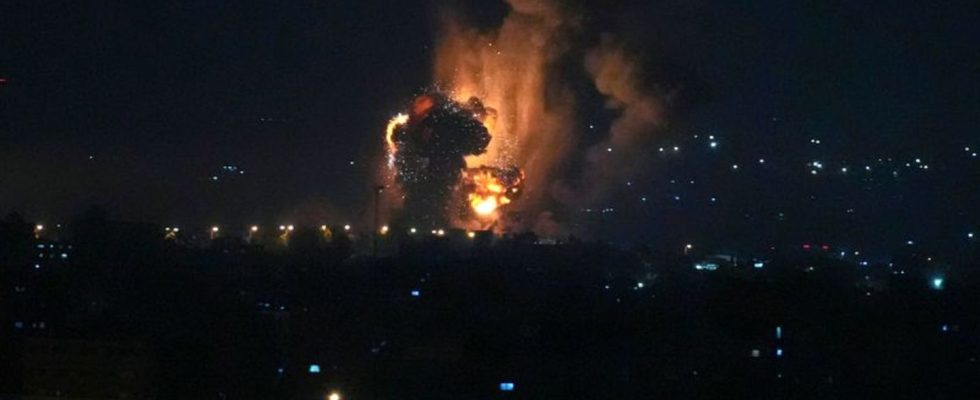conflicts
New escalation in the Middle East: attacks from Lebanon and Israel
Smoke and fire rise after an explosion caused by an Israeli airstrike on Gaza City. photo
© Adel Hana/AP
It is the heaviest shelling from Lebanon in years. In return, Israel attacks Hamas targets in the neighboring country and in the Gaza Strip. There are also new cases of violence in the West Bank.
Shortly before Easter, the situation in the Middle East escalated after heavy rocket fire from Lebanon on Israel. Israel attacked bases of militant Palestinians in the neighboring country and in the Gaza Strip from the air on Friday night. The army blamed them for the fiercest attacks from Lebanon in a decade and a half.
In Israel, too, there were repeated alarms because projectiles were fired from the Gaza Strip. Two Israeli women were killed in a suspected attack by Palestinians in the West Bank.
According to the Israeli army, dozens of rockets were fired from Lebanon into Israeli territory on Thursday – the most since 2006. At that time a war had broken out between the two sides. Both countries have been officially at war since then. There is always tension at the border. Hamas, which rules in the Gaza Strip, also has great influence in the Palestinian refugee camps in Lebanon. Israeli Prime Minister Benjamin Netanyahu said his country’s response would ” exact a heavy price on our enemies.”
Attacks near Tire in Lebanon
Israel’s army said it was targeting Hamas’ “terrorist infrastructure” in Lebanon. Several houses near the city of Tire were damaged in the attacks, eyewitnesses reported to the German Press Agency. The explosions in the early hours of the morning caused panic among local residents. Lebanese security sources said the attack also hit a field near a Palestinian refugee camp.
In the evening, Israel’s army said it also intercepted a drone from the neighboring country.
Lebanon bears responsibility for any shelling fired from its territory, the Israeli military said in a statement. Acting Prime Minister Nadjib Mikati emphasized: “Lebanon vehemently rejects any military escalation emanating from its country and the use of Lebanese territory to conduct operations that could jeopardize existing stability.”
People in Gaza remain in their homes
During the night and in the morning, Israel’s army also flew attacks on the Gaza Strip. According to the military, Israeli fighter jets bombed weapons factories and attack tunnels belonging to the Islamist Hamas, among other things. Streets were empty in the coastal enclave on Friday. Many people stayed at home for fear of missiles. No injuries or deaths were initially reported. A children’s hospital was damaged, according to the Palestinian Ministry of Health.
A spokeswoman for the Israeli army told dpa that the military had attacked targets near the clinic. The army had no knowledge of the fact that the hospital was said to have been damaged.
There were also multiple rocket alarms in some Israeli locations in the south. According to the army, more than 40 missiles were fired from the Gaza Strip into southern Israel during the night. Residents in the region were urged to stay near air raid shelters.
Israelis in West Bank die after shelling
Two Israeli women were killed in a suspected attack by Palestinians in the West Bank. According to the Israeli army, they were shot at in a car. The two sisters, aged between 20 and 30, then had an accident, the Magen David Adom ambulance said. Another woman was critically injured.
The most recent escalation in the Middle East was preceded by Israeli police clashes with Palestinians on the Temple Mount (Al-Haram al-Sharif) in Jerusalem. The Temple Mount is under Muslim administration while Israel is responsible for security. The Temple Mount with the Dome of the Rock and the Al-Aqsa Mosque is the third holiest site in Islam. However, it is also sacred to Jews because two Jewish temples used to stand there. Violent confrontations are frequent in the area around the mosque.
Because Ramadan, the Jewish Passover festival and Easter are taking place at the same time these days, significantly more believers than usual are drawn to the Old City of Jerusalem. On the third Friday of the Muslim month of fasting, Ramadan, thousands of Muslims were again expected for Friday prayers on the Temple Mount.

